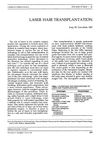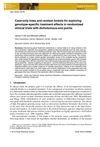 23 citations,
July 2008 in “British journal of dermatology/British journal of dermatology, Supplement”
23 citations,
July 2008 in “British journal of dermatology/British journal of dermatology, Supplement” Topical contact sensitizers can treat certain skin conditions but are rarely used in the U.K.

PCOS requires personalized treatment to improve life quality and reduce health risks.
 1 citations,
May 2021 in “International Journal Of Medical Science And Clinical Invention”
1 citations,
May 2021 in “International Journal Of Medical Science And Clinical Invention” Women with PCOS may have a higher risk of severe COVID-19 due to hormonal imbalances and vitamin D deficiency.
 10 citations,
July 1997 in “Dermatologic Clinics”
10 citations,
July 1997 in “Dermatologic Clinics” Laser hair transplantation can be effective but should be limited to small areas and requires more training to ensure safety and effectiveness.
 1 citations,
February 2024 in “Philosophy, ethics, and humanities in medicine”
1 citations,
February 2024 in “Philosophy, ethics, and humanities in medicine” Aesthetic medicine needs clear ethical guidelines to ensure patient well-being and safety.
 11 citations,
December 1987 in “Aesthetic Plastic Surgery”
11 citations,
December 1987 in “Aesthetic Plastic Surgery” The document concludes that the hCG protocol may help in obesity treatment and could be scientifically justified, but more research is needed.
 48 citations,
November 1992 in “International Journal of Dermatology”
48 citations,
November 1992 in “International Journal of Dermatology” Toxic epidermal necrolysis is a severe skin reaction often linked to drugs, requiring careful medication use and supportive care.
 48 citations,
September 2017 in “Frontiers in Bioscience”
48 citations,
September 2017 in “Frontiers in Bioscience” Nanoparticles show promise for better wound healing, but more research is needed to ensure safety and effectiveness.
 31 citations,
October 2013 in “Psychosomatics”
31 citations,
October 2013 in “Psychosomatics” Psychotropic medications can cause skin reactions, including severe conditions like SJS and TEN, and it's important for psychiatrists to recognize and manage these side effects.
 13 citations,
January 1963 in “Radiation Research”
13 citations,
January 1963 in “Radiation Research” X-ray microbeams can mimic cosmic rays' effects on tissue, aiding wound healing and hair growth.
 January 2017 in “Elsevier eBooks”
January 2017 in “Elsevier eBooks” Sex hormones affect reproduction, sexual development, and oral health, and it's important for dental practitioners to understand their effects and interactions.
 6 citations,
November 2021 in “Oncology Research and Treatment”
6 citations,
November 2021 in “Oncology Research and Treatment” Low Vitamin D receptor levels in breast cancer are linked to worse outcomes and more bone metastases, and could be a marker for prognosis.
 20 citations,
September 2019 in “Nanomaterials”
20 citations,
September 2019 in “Nanomaterials” A portable device can create nanofibers to improve the appearance of thinning hair better than commercial products.
 November 2012 in “Econometric Theory”
November 2012 in “Econometric Theory” Herman Bierens had a successful career in econometrics, contributed to education, and plans to continue research after retirement.
 5 citations,
July 2019 in “Applied statistics/Journal of the Royal Statistical Society. Series C, Applied statistics”
5 citations,
July 2019 in “Applied statistics/Journal of the Royal Statistical Society. Series C, Applied statistics” Case-only trees and random forests improve predictions of treatment effects in clinical trials.
 September 2022 in “Dermatology and therapy”
September 2022 in “Dermatology and therapy” Contact immunotherapy might help treat various skin conditions, but more research is needed to confirm its safety and effectiveness.

OCT can effectively screen and diagnose various medical conditions non-invasively.
 December 2023 in “Health economics and management review”
December 2023 in “Health economics and management review” Radiographers in private hospitals face many health issues due to heavy workloads and long hours.
 165 citations,
February 2014 in “Phytotherapy Research”
165 citations,
February 2014 in “Phytotherapy Research” Myrtle has various health benefits and potential for medicine development.
 205 citations,
September 2018 in “Nutrients”
205 citations,
September 2018 in “Nutrients” Essential oils from Curcuma species, like turmeric, have compounds that can fight inflammation, cancer, and bacteria, and can also stimulate hair regrowth in bald males.
December 2022 in “JAMA network open” 5α-Reductase inhibitors may increase depression risk but not dementia or suicide.
 211 citations,
February 2009 in “European journal of pharmaceutics and biopharmaceutics”
211 citations,
February 2009 in “European journal of pharmaceutics and biopharmaceutics” Hair follicles help absorb and store topical compounds, aiding targeted drug delivery.
 73 citations,
April 1999 in “Dermatologic Clinics”
73 citations,
April 1999 in “Dermatologic Clinics” Lasers and light sources can effectively remove hair, work best on fair skin with dark hair, and usually need multiple treatments.
 February 2024 in “International Journal For Multidisciplinary Research”
February 2024 in “International Journal For Multidisciplinary Research” The herbal hair oil with natural extracts can improve hair health and reduce dandruff.

Bee pollen, green tea, essential oils, and various plant extracts improve skin and hair health.
 47 citations,
January 2017 in “RSC Advances”
47 citations,
January 2017 in “RSC Advances” Keratin peptides can change hair shape gently without harsh chemicals.
 32 citations,
February 2014 in “Psychopharmacology”
32 citations,
February 2014 in “Psychopharmacology” Dutasteride makes alcohol less sedating and may lead to less drinking in men.
 50 citations,
February 2022 in “Nanomaterials”
50 citations,
February 2022 in “Nanomaterials” Nanomaterials show promise in improving wound healing but require more research on their potential toxicity.
 15 citations,
March 1998 in “Journal of Public Policy & Marketing”
15 citations,
March 1998 in “Journal of Public Policy & Marketing” The paper concludes that drug labels should be clear for all, especially for those with low literacy, and suggests aiming for high comprehension test passing rates with diverse test populations.
 December 2024 in “International Journal of Molecular Sciences”
December 2024 in “International Journal of Molecular Sciences” Human umbilical cord stem cell vesicles may help treat aging and related diseases.





























